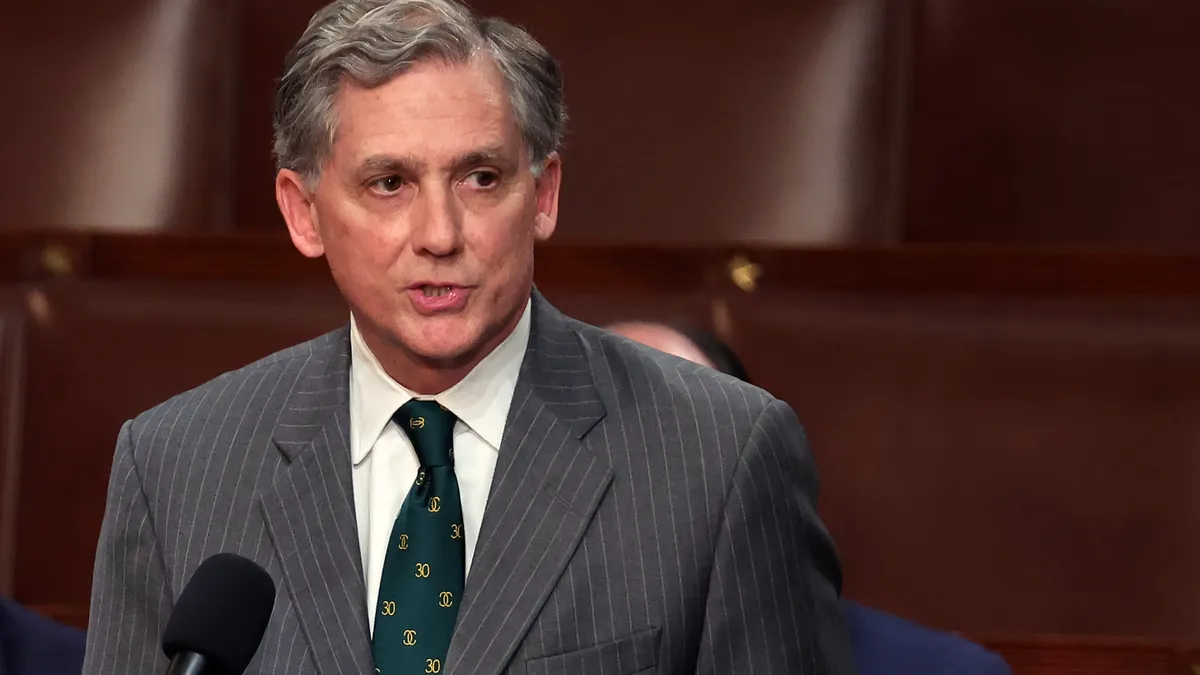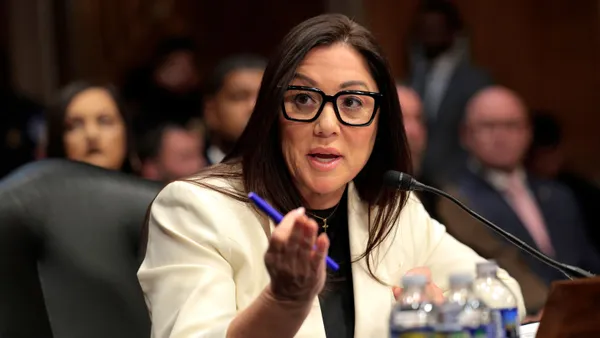Dive Brief:
- The House Financial Services Committee has asked the Securities and Exchange Commission to withdraw a number of rules and policies that ask companies for enhanced disclosures, including a proposal for increased transparency on environmental, social and governance issues.
- The rules were included among a list of Biden-era financial regulatory policies that Republicans on the committee — led by Committee Chair French Hill, R-Ark. — want rescinded. The GOP members requested 14 agency proposals and rules be withdrawn in a Monday letter to Acting SEC Chair Mark Uyeda, including a rule on cybersecurity risk management, strategy and governance disclosures; executive compensation disclosures; and an update to the agency’s Investment Company Act.
- The SEC’s enhanced ESG disclosure rule was aimed at informing and protecting investors by creating “a consistent, comparable, and decision-useful regulatory framework for ESG advisory services and investment companies,” according to the agency’s 2022 proposal. A final version of this anti-greenwashing rule was expected last year, but the rule languished in the proposal stage as administrations changed.
Dive Insight:
The SEC’s “Enhanced Disclosures by Certain Investment Advisers and Investment Companies about Environmental, Social, and Governance Investment Practices” rule was among ESG-related regulations in the rulemaking or proposal phase at the agency expected to be on the chopping block under the Trump administration.
The rule was designed to prevent greenwashing and would create additional proxy and engagement disclosures for investment companies, as well as require funds with ESG terms in the name use such factors as a “significant or main consideration.” Certain ESG funds that consider environmental factors would also be required to disclose greenhouse gas emissions metrics in the portfolio, according to the proposal.
Last year, 21 congressional Democrats — four senators and 17 House representatives — urged former SEC Chair Gary Gensler to finalize the greenwashing rule. Now, with Republicans in control of the executive branch, as well as the House and Senate, the rule is unlikely to ever reach a final stage.
“Under the previous Administration, the SEC lost sight of its mission to protect investors; maintain fair, orderly, and efficient markets; and facilitate capital formation,” Financial Services Committee Republicans wrote in the March 31 letter. “The Financial Services Committee is prepared to work alongside the SEC to undo the damage from former Chairman Gary Gensler’s tenure and uphold our capital markets’ status as the envy of the world.”
Democrats in the last Congress previously argued that the finalization of the enhanced ESG disclosure rule would have served as a complement to the agency’s changes to the Investment Company Act’s Names Rule, which the committee’s Republicans also asked the SEC to rescind this week. The Names Rule amendments, finalized in September 2023, require funds with objectives in their names to invest at least 80% of the portfolio’s assets towards that purpose, explicitly mentioning funds with “ESG” in their name.
The House Republicans also asked the agency’s acting chair to withdraw a rule that requires companies to provide disclosures on pay versus performance in their proxy or information statements. This rule went into effect in October 2022.
The SEC proposed the ESG disclosures rule in May 2022, and the Biden administration said in a December 2023 regulatory agenda update that the rule would be finalized in April 2024. While the agency approved — and later stayed — its final climate-risk disclosure rule last March, the ESG disclosure rule was later designated for an October 2024 finalization, which also never came.
Under Acting Chair Uyeda, the SEC has since withdrawn its defense of the agency’s climate-risk disclosure rule in court and delayed implementation of the Names Rule for funds by six months. The extension means the largest funds will have until June 2026 to comply, with smaller funds having until December 2026. With compliance already delayed, Paul Atkins — Trump’s nominee to lead the agency — will likely have final say on the regulation’s future.
The Financial Services Committee wrote a separate letter to the heads of the Federal Reserve, Federal Deposit Insurance Corporation and Office of the Comptroller of the Currency on March 31, asking the financial regulators to “withdraw or substantially revise” the agencies’ guidance on how large financial institutions should manage climate-related risks.
Acting Comptroller of the Currency Rodney Hood announced the same day that the OCC had rescinded the guidance, which was designed to help financial institutions with over $100 billion in total assets to identify and manage climate-related financial risks. As of Monday, the guidance document is no longer available on the OCC website.












